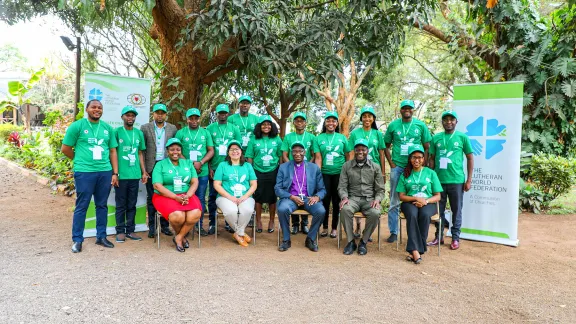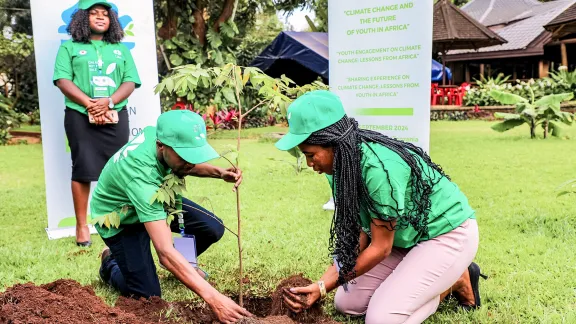
Participants of the Climate Justice Forum meeting in Tanzania, joined by ELCT Bishop Fredrik Shoo (center). Photo: ELCT
Drawing on experience and taking further steps to counter the climate emergency
(LWI) – “The goal of the meeting was to strengthen our advocacy for climate justice by developing a faith-based roadmap for climate action in the Africa region. It also aimed to promote peer learning by sharing different climate justice initiatives and inspiring others,” said Elena Cedillo, Program Executive for Climate Justice at The Lutheran World Federation (LWF).
Young people from LWF member churches in Namibia, Kenya, Nigeria, Madagascar, and Tanzania who have represented the global communion at the UN international climate change conferences and youth climate activists from across Africa gathered in Moshi, Tanzania, from 2 to 4 September.
Welcoming them, Bishop Dr. Fredrick Shoo of the Evangelical Lutheran Church in Tanzania (ELCT) called on young people in Africa to mobilize climate action and provide community education on climate change for present and future generations.
Participants went on to attend the ELCT Youth Leadership Conference, which was held with more than 500 young leaders from 4 to 9 September. They shared their insights on participating in the global climate negotiations and their experiences at the local level in projects such as mangrove restoration, tree planting and clean-up campaigns.

Developing a roadmap for climate justice in Africa. Photo: ELCT
The ELCT also installed Youth Climate Ambassadors during the conference. They committed to advancing climate action by engaging their communities, raising awareness about environmental sustainability and advocating for climate justice at the local and global levels.
Ongoing efforts for climate justice
Referring to the last leadership conferences in the region, Rev. Dr Samuel Dawai, LWF’s Regional Secretary for Africa, said that the climate emergency had been on the agenda “because the situation is becoming increasingly serious with extreme weather events increasing.” In the current year, many countries “have experienced a peak in heat never known to those alive today.” Also, floods cause a lot of damage to human lives and livelihoods of millions of Africans. The workshop was vital to “strengthen the capacities of climate activists to make their voices heard.”
These experiences are supported by data collected by the Intergovernmental Panel on Climate Change (IPCC), the United Nations body for assessing the science related to climate change and published in annual reports. The 2023 report points out a projected surge in negative impacts on human health, the environment and natural ecosystems, water resources, agriculture and food systems.

Tree-planting activity during the meeting of the Africa Climate Justice Forum. Photo: ELCT
“Africa is on the frontlines of the climate crisis, bearing the brunt of its harshest impacts despite having contributed the least to the problem, said Cedillo. “The region faces increased droughts, floods and food insecurity, threatening its ecosystems and people’s livelihoods, stability and future.”
Looking ahead at the upcoming COP29 in Baku, Azerbaijan, and leveraging young people’s expertise and networking capacities, the meeting in Tanzania began the work of developing programs and actions based on the outcomes and resolutions of the Thirteenth Assembly and the Pre-Assemblies. The Assembly resolution on the climate emergency calls for strengthened “advocacy for climate justice at all levels, including by encouraging LWF member churches to incorporate climate justice campaigns into their activities.”


